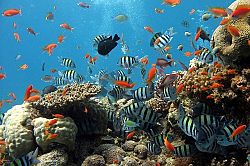

Scientists have confirmed that Australia's Great Barrier Reef has suffered yet another bleaching event. This is the third time in five years that it has happened, with warmer sea temperatures being blamed for potentially huge losses of coral across the reef system.
Coral bleaching occurs when the water is too warm for the coral. The coral then expels the algae living in their tissues which ends up turning the coral white. Hence the term "bleaching". Similar events took place in 2016 and 2017 and ended up damaging as much as two-thirds of the Great Barrier Reef. Now another such event has been recorded, raising great concerns for the reef system.
The Great Barrier Reef Marine Park Authority used information from underwater and aerial observations, as well as science and technology, to discover the current conditions. Chief Scientist, David Wachenfeld, told the BBC, "The reef had only just begun recovering from impacts in 2016 and 2017 and now we have a third event. Climate change is making the extreme events that drive those impacts both more severe and more frequent, so the damage in an event is worse."
Australia has now downgraded its five-year reef outlook to "very poor".
Coral reefs serve as far more than tourist hotspots for divers; they both provide for and protect life. Corals contain some of the most diverse ecosystems on Earth and provide shelter for several marine organisms. Furthermore, they can also help coastlines battle the damaging effects of waves and storms. It is therefore extremely important that these areas are protected.
With global temperatures continuing to rise, and action against climate change only gradually being taken (especially during this pandemic, where the focus of governments worldwide is aimed solely at containing COVID-19), there is a concern that bleaching events such as this will not be preventable in the future.